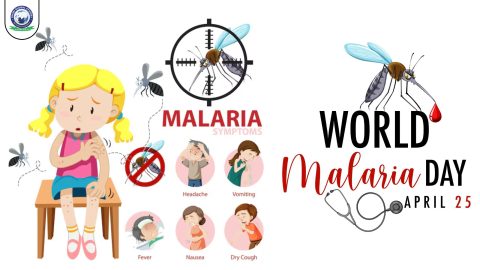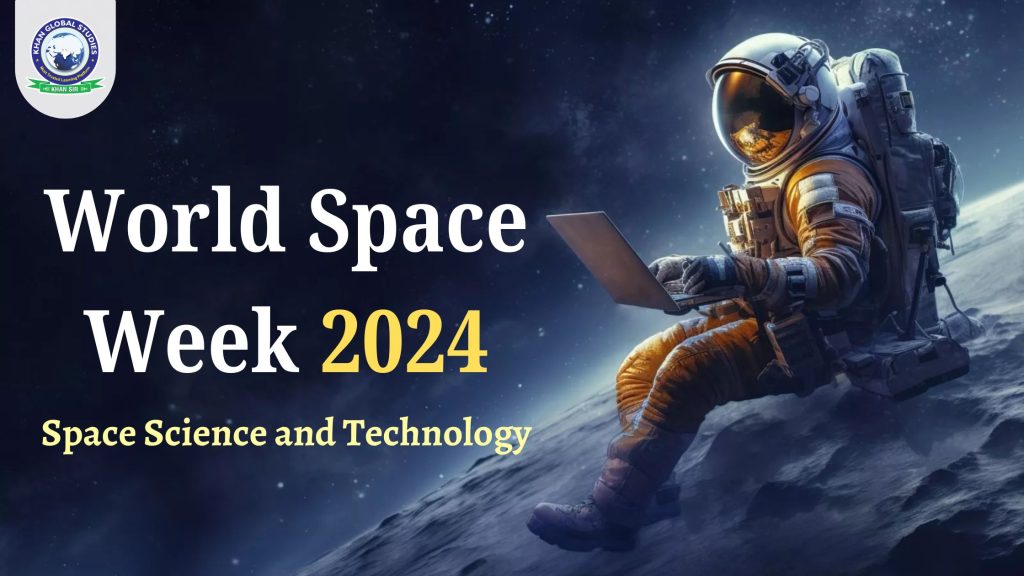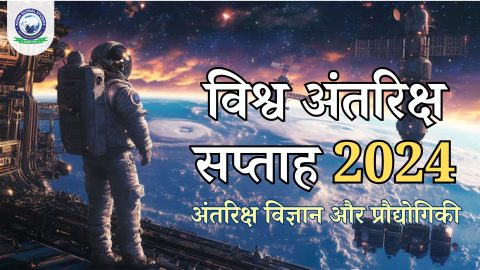World Space Week is a global celebration dedicated to the contribution of space science, technology and its benefits to mankind. Held every year from October 4 to October 10, the event is organized by the United Nations (UN) and the World Space Week Association (WSWA). With the participation of over 90 countries, World Space Week serves as an educational platform to inspire the younger generation and highlight the positive impacts of space exploration on daily life.
Objectives of World Space Week
The primary objective of World Space Week is to raise awareness about space exploration and its impacts on modern life. It also aims to:
- Educate people about advances in space science and technology.
- Promote international cooperation in space-related activities.
- Highlight the positive contributions of space exploration that benefit humanity.
- Inspire the next generation to pursue careers in Science, Technology, Engineering, and Mathematics (STEM).
Annual Themes of World Space Week
World Space Week has a specific theme that guides its events each year. Some past themes have included:
- 2019: “The Moon: Gateway to the Stars”, commemorating the 50th anniversary of the Apollo 11 moon landing.
- 2020: “Satellites Improve Life”, which emphasized the role of satellites in improving everyday life.
- 2021: “Women in Space”, which celebrated the contributions of women to space exploration.
- 2022: “Space and Sustainability” focused on how space technologies help create a sustainable future on Earth.
World Space Week 2024 Theme: Space and Sustainability
The theme of World Space Week 2024 is “Space and Sustainability.” This year, the focus will be on how space technologies contribute to global sustainability efforts. From climate monitoring to disaster management, and even providing internet via satellites, the theme underlines the importance of space in solving global challenges and ensuring a better future for humanity.
History of World Space Week
World Space Week was established on December 6, 1999, when the United Nations General Assembly officially designated it as an annual event. The dates of October 4 to October 10 were chosen to celebrate two important milestones in space history:
- October 4, 1957: Launch of Sputnik 1, the world’s first artificial satellite, which marked the beginning of the space age.
- October 10, 1967: Signing of the Outer Space Treaty, the cornerstone of international space law.
Since its inception, World Space Week has evolved into the world’s largest public space event, with thousands of activities held globally each year.
World Space Week Activities and Events
World Space Week is organized by the World Space Week Association, a non-governmental, non-profit organization supported by national coordinators in over 50 countries. Led by a volunteer board that includes notable individuals such as Buzz Aldrin, Bill Nye (The Science Guy) and Tom Hanks, the organization ensures a variety of engaging events during the week. Some of the key activities include:
- Public lectures and talks by astronauts, space experts and scientists.
- Workshops and events in schools that inspire students to explore space-related topics.
- Exhibitions and fairs showcasing space technologies and innovations.
- Planetarium programs and planetarium shows provide a glimpse of the wonders of the universe.
- Competitions and quizzes focused on space knowledge.
- Art exhibitions and cultural programs highlight the impact of space on human creativity.
These activities are designed to engage a diverse audience ranging from children to professionals and promote a deeper understanding of space science and technology around the world.
Countries Participating in World Space Week
World Space Week is celebrated in over 90 countries, making it a truly global event. Some of the most active participants include:
- United States: NASA organises several events during the week, with universities and schools also participating in special events.
- European countries: The European Space Agency (ESA) organises exhibitions, workshops, and public awareness campaigns.
- India: The Indian Space Research Organisation (ISRO) organises educational programmes and public lectures.
- Russia: The birthplace of Sputnik, Russia organises important space-themed activities and exhibitions.
- China: China participates in educational programmes, conferences, and student-focused activities.
India’s Role in World Space Week
India plays a key role in World Space Week through its space agency, the Indian Space Research Organisation (ISRO). Known for its remarkable advancements in space technology, ISRO uses the week to showcase India’s achievements in space. Missions such as Mangalyaan, Chandrayaan and the upcoming Gaganyaan human space flight mission have earned India global recognition as a leading space power. During World Space Week, ISRO collaborates with schools, colleges and research institutes to promote space science and inspire students to pursue careers in space exploration and engineering.
Impact of Space Technologies on Daily Life
Space technologies have a profound impact on daily life, extending far beyond the exploration of distant planets and galaxies. Some of the key areas where space science plays a vital role include:
- Climate monitoring: Satellites help track weather patterns, monitor deforestation and predict natural disasters, leading to better environmental management.
- Communication: Satellites enable global connectivity, provide internet services in remote areas and facilitate telecommunications around the world.
- Navigation: The Global Positioning System (GPS), developed through space technology, has become indispensable for navigation, from daily commuting to global shipping.
- Agriculture: Space technology assists farmers through precision agriculture techniques, helping to increase crop yields and monitor soil health.
As we look to the future, space technology will continue to play a vital role in solving global challenges, from ensuring food security to tackling climate change.
Conclusion
World Space Week is a global initiative that celebrates the incredible advances in space exploration. As humanity moves towards a future where space plays a vital role, events like World Space Week serve as a reminder of how much space science and technology contribute to improving life on Earth. The 2024 theme “Space and Sustainability” highlights that space technology is not just about exploring the universe, but also about improving life on our home planet.
Frequently Asked Questions
Q: What is the purpose of World Space Week?
Answer: World Space Week aims to make people aware of the benefits of space exploration, promote international collaboration, and inspire the younger generation to pursue careers in STEM fields.
Q: What is the theme of World Space Week for 2024?
Answer: The theme for 2024 is “Space and Sustainability,” which focuses on how space technologies contribute to ensuring sustainability on Earth.
Q: Which countries participate in World Space Week?
Answer: More than 90 countries participate in World Space Week, including the United States, India, Russia, China, and several European countries.
Q: What is India’s role in World Space Week?
Answer: India, through ISRO, organizes educational and public awareness programs during this week to inspire students and explain the importance of space science.
Q: When was World Space Week celebrated for the first time?
Answer: World Space Week was first celebrated in 2000 after its declaration by the United Nations in 1999. World Space Week provides a broad platform every year to highlight the significance of space science and the importance of international collaboration.



